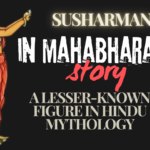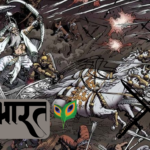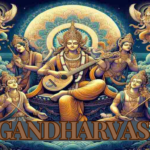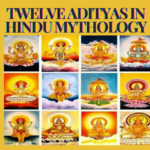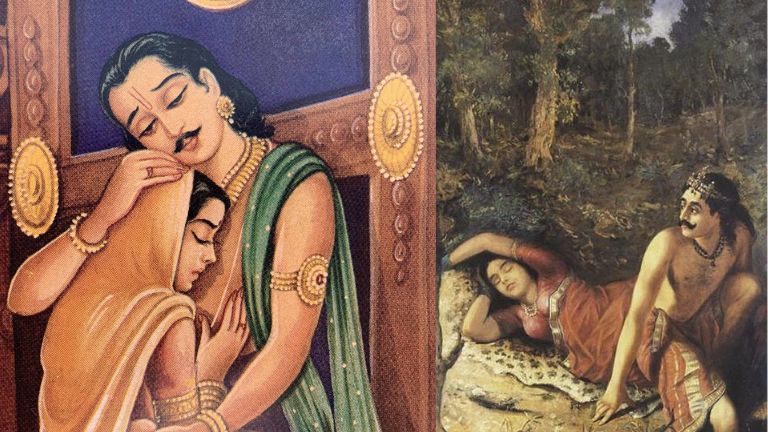In the annals of Indian mythology, few love stories are as captivating and enduring as the tale of Nala and Damayanti. This epic narrative, rooted in the ancient texts of the Mahabharata, weaves together themes of love, valor, fate, and divine intervention. The story of Nala, the virtuous king of Nishada, and Damayanti, the radiant princess of Vidarbha, has been told and retold through generations, capturing the imagination of all who hear it.
Nala: The Virtuous King of Nishada.
In the land of Nishada, there lived a king named Nala. Renowned for his virtues, Nala was not only a just and wise ruler but also a paragon of physical beauty and moral integrity. His handsomeness was matched only by his truthfulness, and he was revered for his self-control and deep devotion to the Brahmins. Knowledgeable in the Vedas, Nala was a man of profound wisdom, whose words were always grounded in truth.
Nala’s reputation extended beyond his virtues. He was a formidable warrior, skilled in the art of archery, and led a powerful army that was loyal and well-disciplined. His generosity was legendary, and he was known to give freely to those in need, a trait that endeared him to his subjects and peers alike. The people of Nishada loved their king, who ruled with a firm yet compassionate hand, always placing the well-being of his kingdom above all else.
Damayanti: The Divine Princess of Vidarbha.
During the same era, in the kingdom of Vidarbha, ruled a king named Bhishmaka. Blessed with a boon from the sage Daman, Bhishmaka was granted four children: three sons named Dam, Dant, and Daman, and a daughter named Damayanti. Damayanti was a vision of beauty, often compared to Goddess Lakshmi herself. Her beauty was such that it was said to surpass that of all the mortal women and even rival the divine.
Damayanti was not just a beautiful princess; she was also known for her intelligence, grace, and noble character. Her beauty and virtues made her the subject of admiration throughout the land, and stories of her unparalleled beauty reached far and wide. Every prince and king who heard of Damayanti desired to win her hand in marriage, but she remained unattainable, her heart waiting for the one true love she believed in.
What happened in the story of Nal Damyanti?
Nala ruler of Nishadh wedded Damayanti in a Swayamvara where she picked him over Divine beings. Subsequent to being impacted by Kali, Nala played a round of dice with his sibling Pushkara and bet away his riches and the realm to him. Nala and Damayanti needed to live in woodlands for quite a long time.
The Fateful Meeting.
The tale of Nala and Damayanti takes a dramatic turn when the two meet for the first time. According to the legend, Nala, while wandering in his palace gardens, comes across a swan with a golden hue. This swan, however, was no ordinary bird; it had the gift of speech. Captivated by the beauty of the swan, Nala captured it, and to his astonishment, the swan began to speak, extolling the virtues and beauty of Damayanti.
The swan, sensing Nala’s interest, offered to act as a messenger between him and Damayanti. Nala agreed, and the swan flew to Vidarbha, where it found Damayanti in her gardens. The swan spoke of Nala’s virtues and appearance, and Damayanti, upon hearing of Nala, felt an instant connection. The two, though separated by distance, were united by the words of the magical swan, and both began to dream of a life together.
Swayamvara: The Test of True Love.
As was customary in those times, a Swayamvara was arranged for Damayanti. A Swayamvara was an ancient practice where a princess could choose her husband from among a gathering of suitors. Kings and princes from across the land, all eager to marry the famed beauty, arrived in Vidarbha. Among them was Nala, who was as determined as the others to win Damayanti’s hand.
However, the gods themselves had taken notice of Damayanti’s beauty and virtues, and they too desired to marry her. Four gods – Indra, Agni, Varuna, and Yama – arrived at the Swayamvara disguised as Nala. This presented Damayanti with a daunting challenge: how could she distinguish her beloved Nala from the gods who had taken on his form?
Damayanti, driven by her love and guided by her heart, observed the five Nalas carefully. She noticed that the gods, unlike Nala, did not touch the ground and did not blink their eyes. With these subtle clues, she was able to identify the true Nala. In a moment of profound emotion, Damayanti garlanded Nala, choosing him as her husband over the gods.
What explanation did Damayanti give for choosing Nala as her husband?
Damayanti experienced issues spotting Nala among the admirers since he masked himself to test her affection and dedication. Damayanti picked Nala as her significant other in light of the fact that she perceived his actual character and saw his temperances radiating through, in spite of his camouflage.
The Trials and Tribulations.
The marriage of Nala and Damayanti was a joyous event, celebrated by the entire kingdom. However, their happiness was short-lived, as fate had other plans. Kali, the embodiment of discord, had also desired to marry Damayanti but arrived too late for the Swayamvara. Enraged by his failure, Kali vowed to ruin Nala’s life.
Kali bided his time and eventually found an opportunity to strike. He possessed Nala, leading him to make a series of poor decisions, including losing his kingdom in a game of dice. Deprived of his throne and wealth, Nala and Damayanti were forced to wander in the forests, enduring great hardships. Despite their suffering, Damayanti remained steadfast in her love and loyalty to Nala.
Nala, stricken with guilt for the hardships Damayanti had to endure, decided to leave her while she slept, hoping that she would be able to return to her father’s kingdom and live a life of comfort. However, Damayanti, determined to find her husband, set out on her own, facing numerous challenges along the way.
Reunion and Redemption.
After a period of separation filled with trials and tribulations, the couple’s fortunes began to change. Nala, with the help of the serpent king Karkotaka, was freed from Kali’s influence. He regained his form and strength and eventually entered the service of Rituparna, the king of Ayodhya, as a charioteer. Under Rituparna, Nala learned the secrets of the game of dice, a skill that would prove crucial in regaining his kingdom.
Meanwhile, Damayanti’s unwavering faith and determination paid off when she orchestrated a plan to find Nala. She arranged another Swayamvara, knowing that Nala, disguised as a charioteer, would be drawn to it. When Nala arrived, Damayanti recognized him despite his disguise. The couple was joyfully reunited, and Nala, with his newfound knowledge, challenged the usurper who had taken his throne. With his skill in dice, Nala won back his kingdom and was restored to his rightful place as the king of Nishada.
The Legacy of Nala and Damayanti.
The story of Nala and Damayanti is not just a tale of love and adventure; it is a story of resilience, faith, and the power of true love to overcome even the most insurmountable obstacles. Their journey, fraught with challenges, ultimately leads to a triumphant reunion and the restoration of Nala’s kingdom. The legend of Nala and Damayanti continues to inspire and captivate audiences, reminding us of the timeless values of loyalty, courage, and devotion.
What is the moral of the story of Nala and Damayanti?
The fundamental subject of this story is the persevering through force of affection. Damayanti never surrenders her adoration for her better half, even after he loses all that and vanishes. She is even ready to remember him when his appearance has changed into that of a bantam Desire is likewise a significant subject in this legend.
Their tale, preserved in the pages of the Mahabharata, remains one of the most cherished stories in Indian mythology, symbolizing the enduring bond between a husband and wife, and the belief that love, when true, can conquer all.
Disclaimer : While Writing this post have taken some content reference from different blog posts around the web and also chatgpt. If you think I have directly copy paste your content ,please contact me . I assure you that I will remove the content within 24 hours.
